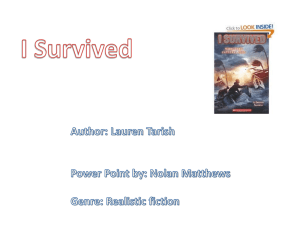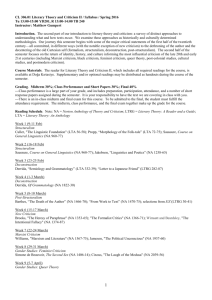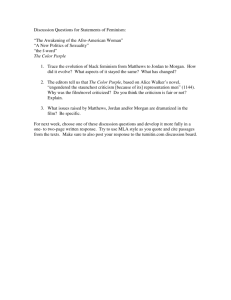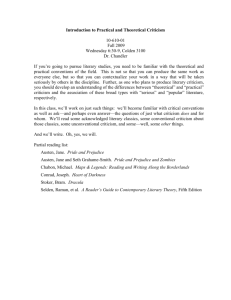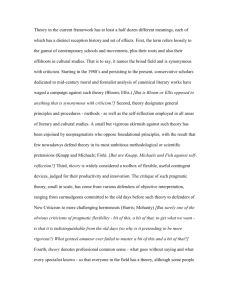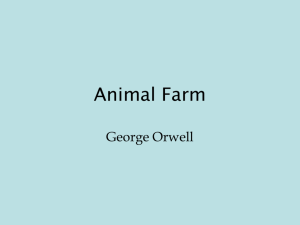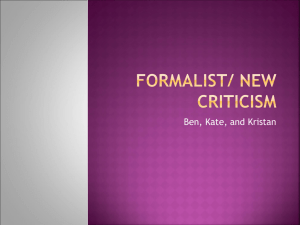LITERARY THEORY—ENG 306 Section 01 M,TH 9:45
advertisement
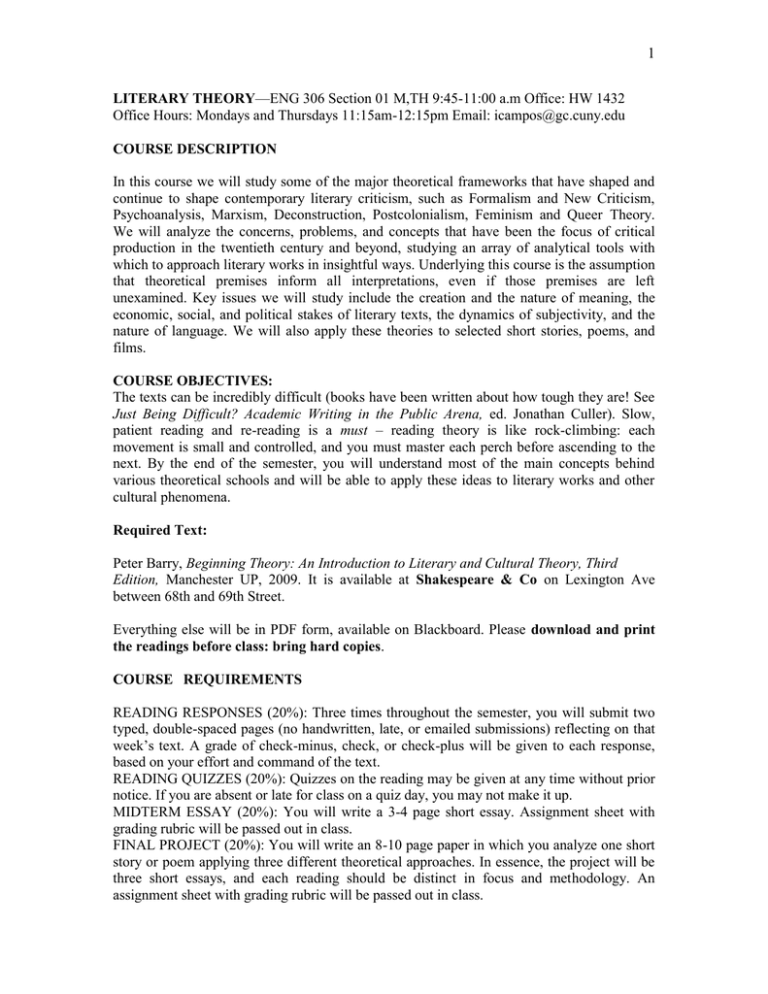
1 LITERARY THEORY—ENG 306 Section 01 M,TH 9:45-11:00 a.m Office: HW 1432 Office Hours: Mondays and Thursdays 11:15am-12:15pm Email: icampos@gc.cuny.edu COURSE DESCRIPTION In this course we will study some of the major theoretical frameworks that have shaped and continue to shape contemporary literary criticism, such as Formalism and New Criticism, Psychoanalysis, Marxism, Deconstruction, Postcolonialism, Feminism and Queer Theory. We will analyze the concerns, problems, and concepts that have been the focus of critical production in the twentieth century and beyond, studying an array of analytical tools with which to approach literary works in insightful ways. Underlying this course is the assumption that theoretical premises inform all interpretations, even if those premises are left unexamined. Key issues we will study include the creation and the nature of meaning, the economic, social, and political stakes of literary texts, the dynamics of subjectivity, and the nature of language. We will also apply these theories to selected short stories, poems, and films. COURSE OBJECTIVES: The texts can be incredibly difficult (books have been written about how tough they are! See Just Being Difficult? Academic Writing in the Public Arena, ed. Jonathan Culler). Slow, patient reading and re-reading is a must – reading theory is like rock-climbing: each movement is small and controlled, and you must master each perch before ascending to the next. By the end of the semester, you will understand most of the main concepts behind various theoretical schools and will be able to apply these ideas to literary works and other cultural phenomena. Required Text: Peter Barry, Beginning Theory: An Introduction to Literary and Cultural Theory, Third Edition, Manchester UP, 2009. It is available at Shakespeare & Co on Lexington Ave between 68th and 69th Street. Everything else will be in PDF form, available on Blackboard. Please download and print the readings before class: bring hard copies. COURSE REQUIREMENTS READING RESPONSES (20%): Three times throughout the semester, you will submit two typed, double-spaced pages (no handwritten, late, or emailed submissions) reflecting on that week’s text. A grade of check-minus, check, or check-plus will be given to each response, based on your effort and command of the text. READING QUIZZES (20%): Quizzes on the reading may be given at any time without prior notice. If you are absent or late for class on a quiz day, you may not make it up. MIDTERM ESSAY (20%): You will write a 3-4 page short essay. Assignment sheet with grading rubric will be passed out in class. FINAL PROJECT (20%): You will write an 8-10 page paper in which you analyze one short story or poem applying three different theoretical approaches. In essence, the project will be three short essays, and each reading should be distinct in focus and methodology. An assignment sheet with grading rubric will be passed out in class. 2 CLASS PARTICIPATION (20%): The success of the class depends on your active reading and involvement. An A in Class Participation would indicate careful reading and preparation, respectful and productive participation in discussion, and professionalism in all things. Behavior that will impact your class participation grade includes belligerence towards me or your classmates, disengagement in class discussion, preoccupation with non-class related activities, and coming to class without the required texts – or without having read them. CLASS POLICY: Attendance/Tardiness: If you miss more than three days of class (excused or otherwise), your final grade will be reduced by a half-letter for each absence. Any student who misses more than six class sessions for any reason will receive an F. When absent, it is your responsibility to find out what you missed and obtain the necessary information from another student. Any tardiness will count as one-half of an absence. Our class meetings are short – just 75 minutes – so it is important we make good use of our time. Late work: I do not accept late work or email submissions. All homework and assignments should be ready to be handed in at the beginning of class on the day they are due. If extenuating circumstances arise, please contact me as soon as possible. Unless you have cleared it with me, please do not use any devices that are prohibited during airplane takeoff – no laptops, iPads, Kindles, iPhones, etc. PLAGIARISM: Plagiarism and cheating will not be tolerated. Plagiarism is defined as word- for-word copying without acknowledgment of the language or ideas of another writer. Obviously, having another person write or dictate all or part of one’s composition is forbidden. In addition, a writer should copy no printed passage, no matter how brief, without acknowledging its source and either placing it in quotation marks or setting it aside as a blocked quotation. This applies to even the briefest of phrases if they are truly individual and distinctive. Hunter College regards acts of academic dishonesty (e.g., plagiarism, cheating on examinations, obtaining unfair advantage, and falsification of records and official documents) as serious offenses against the values of intellectual honesty. The college is committed to enforcing the CUNY Policy on Academic Integrity and will pursue cases of academic dishonesty according to the Hunter College Academic Integrity Procedures. ACADEMIC ACOMMODATION: In compliance with the American Disability Act of 1990 (ADA) and with Section 504 of the Rehabilitation Act of 1973, Hunter College is committed to ensuring educational parity and accommodations for all students with documented disabilities and/or medical conditions. It is recommended that all students with documented disabilities (Emotional, Medical, Physical and/or Learning) consult the Office of ACCESSability located in Room 1124 East to secure necessary academic accommodations. For further information and assistance please call (212-772-4857) /TTY (212-650-3230). READING SCHEDULE: Week One: Introduction to Theory --Monday, August 27th 1. Introduction to the Course --Thursday, August 30th 1. Chapter I Theory Before Theory (Barry) 3 Week Two: Formalism (Russian) --Monday, September 3rd No Class Labor Day --Thursday, September 6th Formalisms (BB) Victor Shklovsky, “Art as Technique” (BB) Mikhail Bakhtin “Discourse in the Novel” (BB) First two chapters of The Brothers Karamazov Dostoevsky (BB) Week Three: Formalism (New Criticism)/Structuralism --Monday, September 10th Cleanth Brooks “The Formalist Critics” (BB) Brooks “The Language of Paradox” (BB) Emily Dickinson poems (BB) --Thursday, September 13th Chapter II: Structuralism (Barry) Edgar Allan Poe “The Oval Portrait (Barry) Week Four: Structuralism --Monday, September 17th No Class --Thursday, September 20th Ferdinand Sausurre Course in General Linguistics (BB) Roland Barthes “The Death of the Author,” (BB) Week Five: Structuralism --Monday, September 24th Levi-Strauss “The Structural Study of Myth” (BB) --Thursday, September 27th J. L. Austin How to Do Things With Words (BB) Roman Jakobson “Two Aspects of Language” (BB) Week Six: Post-Structuralism and Deconstruction --Monday, October 1st Nietzsche “On Truth and Lies in a Non-Moral Sense” (BB) Nietzsche excerpts from Will to Power (BB) --Thursday, October 4th Chapter III Post-Structuralism and Deconstruction (Barry) Dylan Thomas (Poem) “A Refusal to Morn the Death” (Barry) Week Seven: Deconstruction --Monday, October 8th No Class --Wednesday, October 10th Classes Follow a Monday Schedule Derrida Différance (BB) --Thursday, October 11th Foucault Discipline and Punishment (BB) Week Eight: Post-Structuralism/ Pyschoanalysis --Monday, October 15th 4 Foucault from The Order of Things (BB) Jorge Luis Borges “The Analytical Language of John Wilkins” http:// www.alamut.com/subj/artiface/language/johnWilkins.html Midterm Essay Due 3-4 pages --Thursday, October 18th Chapter V Psychoanalytic Criticism (Barry) Edgar Allan Poe “The Purloined Letter” (BB) Week Nine: Psychoanalysis --Monday, October 22nd Freud The Interpretation of Dreams (BB) --Thursday, October 25th Freud Beyond the Pleasure Principle (BB) Rene Girard “Triangular Desire” (BB) Week Ten: Psychoanalysis/ Feminism --Monday, October 29th Lacan “The Mirror Stage...” (BB) --Thursday, November 1st Feminism Chapter VI Feminist Criticism (Barry) Week Eleven: Feminism --Monday, November 5th Simone de Beauvoir The Second Sex (BB) --Thursday, November 8th Luce Irigaray “Commodities Amongst Themselves (1977) Julie Kristeva “Approaching Abjection” from Powers of Horror Week Twelve: Feminism/Queer Theory --Monday, November 12th Laura Mulvey “Visual Pleasure and Narrative Cinema” Gentlemen Prefer Blondes Preminger (film) --Thursday, November 15th Queer Theory Monique Wittig excerpt from The Straight Mind and Other Essays Judith Butler “Imitation and Gender Insubordination” (BB) Week Thirteen: Queer Theory --Monday, November 19th Eve Sedgwick Between Men (BB) --Thursday, November 22nd No Class—Thanksgiving Week Fourteen: Postcolonism --Monday, November 26th Chapter X Postcolonial Criticism (Barry) Edward Said from Orientalism (BB) --Thursday, November 29th Homi Bhabha The Location of Culture (BB) Week Fifteen: Marxism --Monday, December 3rd Chapter VIII Marxist Criticism (Barry) 5 Hegel “Dialectics” from The Science of Logic (BB) --Thursday, December 6th Marx The German Ideology (BB) Karl Marx “The Manifesto of the Communist Party” (BB) Marx “Wage Labor and Capital” (BB) Marx From Capital (on commodities) (BB) Week Sixteen: Marxism --Monday, December 10th Walter Benjamin “The Work of Art in the Age of Mechanical Reproduction Louis Althusser “Ideology and Ideological State Apparatuses” (BB) --Thursday, December 13th Adorno and Horkheimer "The Culture Industry as Mass Deception” from the Dialectic of Enlightenment (BB) Final Project Due 8-10 pages 6
